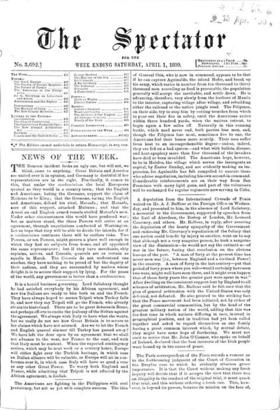A deputation from the International Crusade of Peace waited on
Mr. A. J. Balfour at the Foreign Office on Wednes- day, and presented to him, in the absence of Lord Salisbury, a memorial to the Government, supported by speeches from the Earl of Aberdeen, the Bishop of London, Mr. Leonard Courtney, and others. Mr. Balfour, in reply, after assuring the deputation of the hearty sympathy of the Government and endorsing Mr. Courtney's repudiation of the fallacy that one nation could benefit by injury to another, went on to say that although not a very sanguine person, he took a sanguine view of the diminution—he would not say the extinction—of war in the future, basing that conclusiun on the obvious lessons of the past. "A man of forty at the present time has never seen war [i.e., between England and a civilised Power] in the country. A man of forty in the last century—put that period of forty years where you will—would certainly have seen two wars, might well have seen three, and it might even happen that of those forty years the greater part were spent in war." After dwelling on the consistent support lent by England to all schemes of arbitration, Mr. Balfour said he felt sure that the plan of general arbitration with the United States was only deferred, not defeated. He also pointed to the striking fact that the Peace movement had been initiated, not by either of the great commercial communities, but by the head of the greatest military nation of the world, adding that this was the first time in which nations differing in race, in creed, in geographical position, and in tradition had yet been called together and asked to regard themselves as one family having a great common interest which, by mutual debate, they might have some hope of furthering. We must not omit to notice that Mr. John O'Connor, who spoke on behalf of Ireland, declared that the beat interests of the Irish people were bound up in the cause of peace.






































